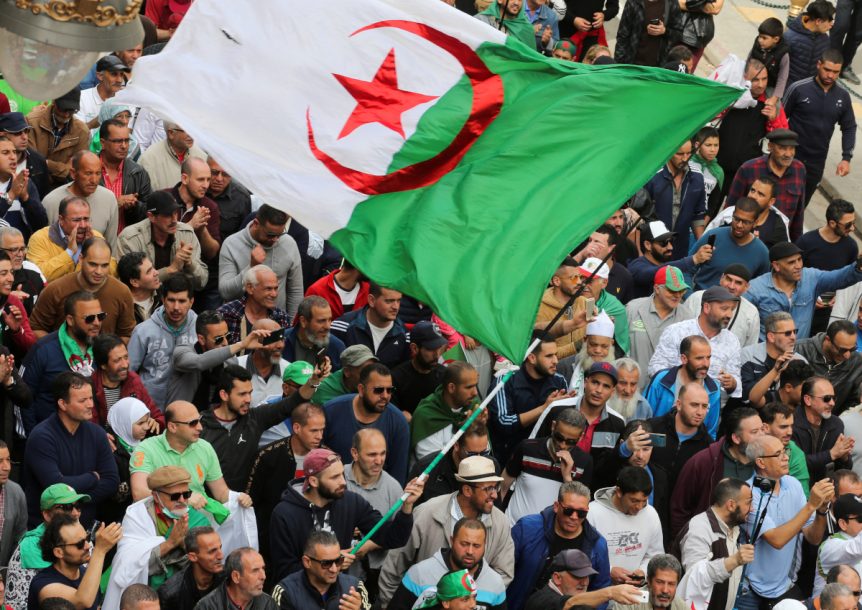On 18 February 2021, with the potential resumption of protests on the eve of the two-year anniversary of the “Hirak” pro-democracy protest movement, President Abdelmadjid Tebboune announced a presidential pardon for at least thirty Hirak detainees. As of 21 February, thirty-eight prisoners of conscience were released according to the National Committee for the Release of Detainees (CNLD), although it remains unclear how many were pardoned. At least nineteen of them were only released conditionally while awaiting judgment, such as journalist Khaled Drareni, union activist Dalila Touat and political activist Rachid Nekkaz.
Throughout the past year, President Tebboune issued several presidential pardons in February, April and July 2020 for a total of 19,502 detainees, out of which thirteen were Hirak detainees. These releases, while a welcome development for the detainees and their families, have not yet indicated any willingness from authorities to reverse an unrelenting crackdown on civic space.
On the anniversary of the Hirak, the undersigned organisations reiterate their call for the international community to urge the Algerian government to put an end to policies aimed at silencing those who seek peaceful outlets and means of expression, in line with the Algerian Constitution, the International Covenant on Civil and Political Rights (ICCPR) and the African Charter on Human and Peoples’ Rights.
We appeal to the international community to take a more assertive public position clearly condemning human rights violations, with the aim of protecting Algerian citizens striving to safeguard their fundamental freedoms. The international community should call on the authorities to release all arbitrarily-held detainees and cease all judicial harassment and intimidation against them and the judiciary. Increased scrutiny on Algeria is direly needed, and international actors are urged to closely monitor the human rights situation and trials of activists, journalists and human rights defenders.
International actors should further ensure the prompt investigation of allegations of physical, sexual and psychological abuse in detention, such as those raised by student Walid Nekkiche on 1st February 2021, after fourteen months of arbitrary pre-trial detention, and suspected perpetrators should be held accountable.
As the Hirak became a largely online movement after protests were voluntarily halted in March 2020, authorities have accelerated the arbitrary prosecution and harassment of individuals, including activists and journalists, in most cases merely for expressing their opinion online.
The number of prisoners of conscience has doubled in the second half of 2020 according to the documentation of the National Committee for the Release of Detainees (CNLD), overshadowing the presidential pardons, and illustrating the increased criminalisation of public freedoms. About one thousand prosecutions stemmed from individuals exercising their rights to free expression and peaceful assembly in 2020, as reported by the Collective of Lawyers for Prisoners of Conscience. Sixty-three individuals have been prosecuted on charges of offence to the President, a charge not used more than four times in twenty years under the Bouteflika presidency.
Among those targeted, Algerian women’s rights organisations recently jointly denounced the arbitrary detention and sentencing of activists Dalila Touat and Naïma Abdelkader. Other prisoners of conscience include activist Oussama Taifour, sentenced in October 2020 to one year in prison after he denounced online a work suspension related to his activism; activist Zoheir Kaddam, sentenced in June 2020 to one year in prison, although he had neither access to his legal file nor his lawyers present; or activist Khaldi Ali[1], sentenced in November 2020 to three years in prison based on critical social media publications. Furthermore, in September 2020, two men were sentenced to three years of prison and forty-two others to suspended terms after police raided what they alleged was a “gay wedding”.
In January 2021, Judge Saad Eddine Merzouk was sanctioned by the Superior Judicial Council with a six months’ suspension after making critical public declarations. Prior to this, in February 2020, prosecutor Mohamed Belhadi was transferred, seemingly arbitrarily, after he requested the acquittal of sixteen protesters.
Amendments to the Penal Code passed in April 2020 now allow for the criminalisation of free expression, assembly and association. Executive decree 20-332 in November 2020 tightened controls over digital media, including a regime of prior authorization, which added to an already restrictive legal framework under the Law 12-06 on Associations or the 2012 Information Law.
At least thirteen media outlets have been made unavailable on Algerian networks in 2020[2], adding to five others in 2019[3]. Journalists Khaled Drareni, Abdelkrim Zeghileche, Mustafa Bendjama – who says he was arrested at least fifteen times – and Said Boudour are among those sentenced and/or repeatedly prosecuted.
A top-down constitutional revision, adopted in December 2020 following a referendum with a historically low official turnout rate, was largely criticised for its lack of transparency and inclusivity. The revision does not bring about tangible progress on the rule of law, but instead constitutionalizes the army’s political role, includes weak guarantees on rights and freedoms – deleting the right to freedom of conscience – and perpetuates the executive authorities’ domination over all institutions.
In addition to the erosion of fundamental freedoms witnessed in the past year, the weaponizing of the pandemic against civil society and journalists has defied calls by the United Nations to decongest detention facilities, and only serves to foster conditions for violence and instability.
Signatories:
- Article 19
- Cairo Institute for Human Rights Studies (CIHRS)
- CIVICUS: World Alliance for Citizen Participation
- National Centre for Development Cooperation (CNCD-11.11.11)
[1] Also identified as Khaldi Yacine.
[2] Casbah Tribune, Tariq News, Twala.info, Maghreb Emergent, Radio M, Interlignes, Dzvid, Le Matin d’Algérie, L’Avant-Garde, Ultra Sawt, Yabiladi.com, Essaha.com and Shihab presse.
[3] Tout sur l’Algérie (TSA), Observ’Algérie, Algérie Part, Algérie Patriotique and Ma Revue de Presse DZ.
Share this Post

